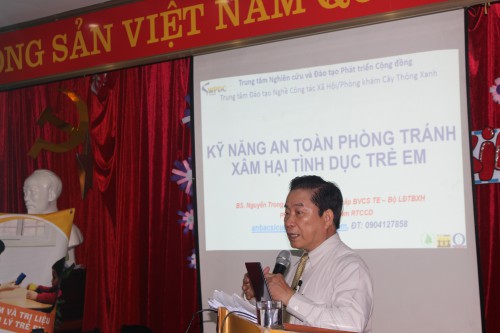Social Work in Vietnam
A lot of progress has been made in the development of social work in Vietnam since it underwent rapid changes since 1995 (Hugman, Lan & Hong, 2007). Social work has since been approved by the government as a recognised profession in Vietnam in 2010 (Nguyen, Nguyen & Farber, 2017).
Despite this considerable progress, the profession and individual social workers still need support. To further contribute to the development of social work as a profession in Vietnam, further education, professional training and employment opportunities could be enhanced (Hugman, Lan & Hong, 2007).
Key stakeholders of social work in Vietnam have expressed that they would like social work in Vietnam to focus on human dignity, rights and social justice (Nguyen & Nguyen, 2017).
What does RTCCD do?
RTCCD aims to enhance the skills of social and para-social workers who are engaged with vulnerable children in Vietnam. Efforts by RTCCD focus on targeted skill-based training that has been informed by needs assessments of social workers.
This work contributes to expanding the individual capacities of social workers in Vietnam and enhancing overall development of social work as a profession in Vietnam.
Activities of RTCCD
From 2013 to 2019, RTCCD and HealthRight International have jointly implemented the long-term corporation to strengthen the social work profession in child welfare in Vietnam. After nine years of implementation, RTCCD has conducted a large number of activities which contributed to the enhancement of the social work profession in Vietnam. In total, RTCCD social work team has developed 16 training modules including child abuse prevention and intervention, foster care, case management and other issues related to child protection. Some courses and out-reach programs are highlighted with their innovative impact. Cyber safety, Positive parenting skills and healing parenting to children with trauma, Non-violent communications, ToT for primary and middle school teachers, substance abuse and its impact on children, and sex education for children with disability are catalyst trainings which are expected to generate initiatives for social work practice in child care and protection.
In 2020 – 2021, the project between RTCCD and HealthRight International was suspended due to the spread of the COVID-19 pandemic. However, the RTCCD project team maintained some training activities on a voluntary basis. The project team has organized 39 free training courses (20 online courses via Zoom) for teachers of kindergartens and primary schools, workers of industrial zones, and parents. The training courses focused on the topics of first aid and injury prevention, guidance on the prevention of COVID-19, and prevention of child abduction.
In 2022, the online learning website, https://kynangctxh.vn, was established with technical support from HealthRight International and financial support from the Boeing Foundation. This platform enables social workers and collaborators working in the community to learn and enhance their social work practice skills at any time and from anywhere, overcoming barriers such as time constraints, geographical distances, and financial limitations.
RTCCD has provided social work field education placements to support social work students. Interns and volunteers have also had opportunities to become involved with social work activities. A needs assessment of social workers was conducted in 2015, allowing for a more targeted approach to enhancing the skills of social workers in Vietnam.
In an attempt to upskill social workers, RTCCD has developed and adapted social work training and teaching models and methods to pilot a virtual training platform. These have involved live seminars via Zoom as well as video clips, infographics and situational analyses that participants can complete in their own time. The four courses consisted of:
- A brief introduction on social work, including confidentiality and professional boundaries.
- Child protection, including in the context of family domestic violence or parental substance abuse.
- Psychosocial support which looked at abuse, trauma, stigma and understanding safety from the victim and service provider perspectives.
- Therapeutic Interventions and activities that explored thoughts, feeling, loss, grief and self-care.
RTCCD has worked closely with the Vietnam Association for Protection of Children’s Rights, the Association for Protection of Children’s Rights (APCR) in Hanoi, Bac Ninh, Thai Nguyen, Thanh Hoa, Quang Nam and Ben Tre, and Hanoi National University of Education.
What are the outcomes of RTCCDs work?
Since 2013, the training courses run by RTCCD have involved more than 8,000 participants and over 13 different organisations.
Following one of the training sessions, a post-training evaluation survey reported 92.5% of participants rating their experience with the training content as good, with all participants stating the content was very helpful and applicable to their work.
More training courses on foster care have also been requested by participants to improve their understanding of this new concept.
These projects have focused on sustainability and aim to continue developing further modules through the website as an online platform taking into consideration feedback from users. These efforts demonstrate RTCCD’s ability to maintain strong stakeholder relationships and capabilities in developing and conducting comprehensive training programs.
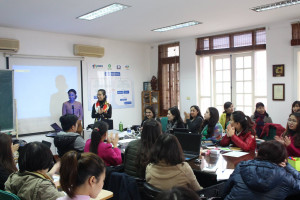 |
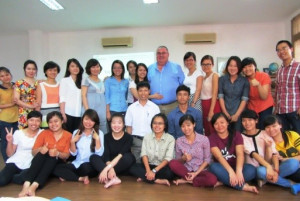 |
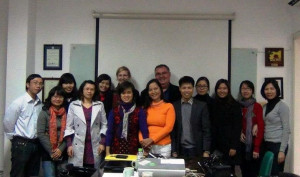 |
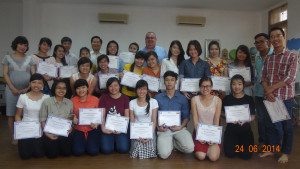 |
 |
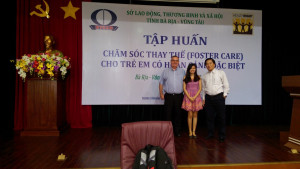 |
References:
Hugman, R., Lan, N. T. T., & Hong, N. T. (2007). Developing social work in Vietnam. International Social Work, 50(2), 197–211. https://doi.org/10.1177/0020872807073985
Nguyen, H., & Nguyen, T. T. (2017). Optimistic but Confused: Perceptions about the Mission and Core Values of Social Work in Vietnam by Vietnamese Policy‐makers, Social Work Faculty and Practitioners. Asian Social Work and Policy Review, 11(1), 53–65. https://doi.org/10.1111/aswp.12113
Nguyen, H., Nguyen, T. T., & Farber, N. (2017). Vision, Challenges and Solutions in the Development of Professional Social Work in Vietnam: Perceptions of Key Stakeholders. International Journal of Social Science Studies, 5(3), 21–. https://doi.org/10.11114/ijsss.v5i3.2121


